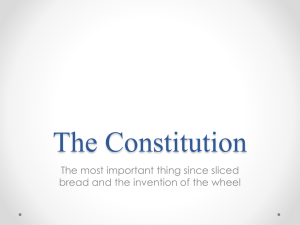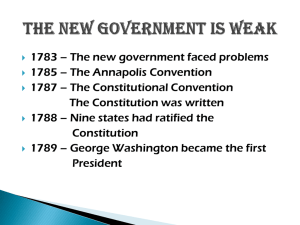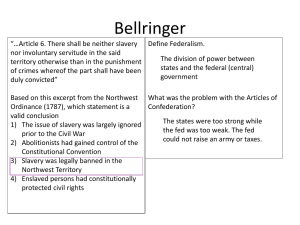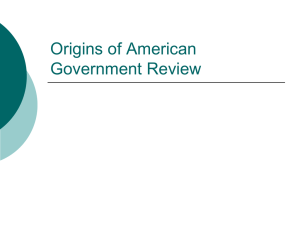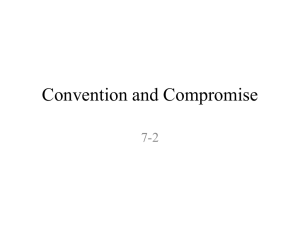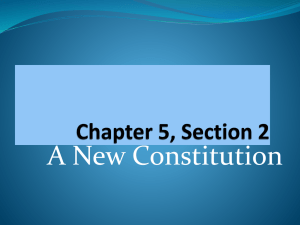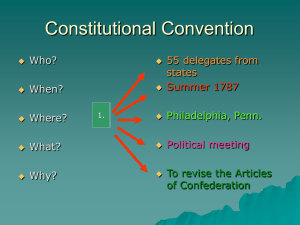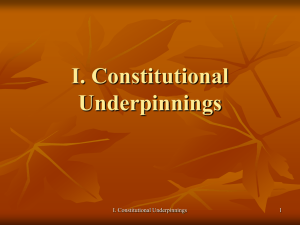CHAPTER 7 TEST REVIEW
advertisement
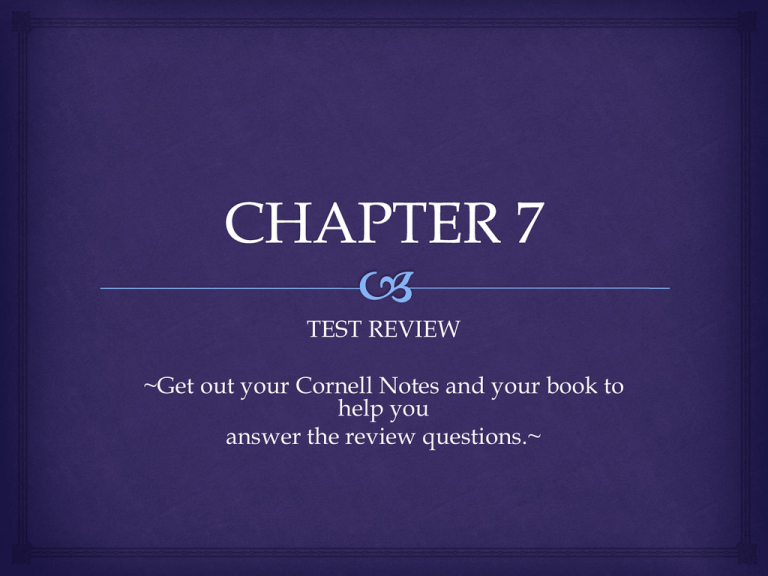
TEST REVIEW ~Get out your Cornell Notes and your book to help you answer the review questions.~ Game/Review rules: 1. Teacher will read question. 2. Students will look up answers in book, workbook and/or notes. 3. Teacher will take the majority answer. 4. Class with the most correct point wins and each student receives a 5 pt. ticket. a. Governor b. President c. State representative d. State senator a. governor a. Appointed representatives b. Elected representatives c. Kingships d. Monarchies b. Elected representatives a. Currency to be created b. Foreign troops c. New states in the west d. The military c. New states in the West a. Mississippi Territory b. Northwest Territory c. Ohio Territory d. Western Territory b. Northwest Territory a. Drawing maps b. Native Americans c. New states d. The nation’s finances d. The nation’s finances a. Criminals’ homes b. Farmers’ land c. Stolen goods d. Money from taxes b. Farmers’ land a. The need for getting money b. The practice of slavery c. Women’s right to vote d. The right of rebellion b. The practice of slavery a. New Jersey Plan b. New York Plan c. Northwest Territory Plan d. Virginia Plan d. Virginia Plan a. The Great Compromise b. The three-fifths Compromise c. The Two-Thirds Compromise d. The Washington Compromise a. The Great Compromise a. Limit the number of new states b. Limit trade c. Require religion to be practiced d. Take rights away from people d. Take rights away from people a. Baron de Montesquieu b. Benjamin Franklin c. John Adams d. John Locke d. John Locke a. Maryland b. New York c. North Carolina d. Rhode Island d. Rhode Island a. Constitutional branch b. Executive branch c. Judicial branch d. Legislative branch b. Executive branch a. Constitutional branch b. Executive branch c. Judicial branch d. Legislative branch c. Judicial branch a. Allowed for the spread of slavery b. Encouraged the sale of land to speculators c. Provided a method for petitioning for statehood d. Denied a bill of rights for settlers c. Provided a method for petitioning for statehood a. Strength of the Articles of Confederation b. Weakness of the Virginia Plan c. Weakness of the Articles of Confederation d. Strength of the United States Constitution c. Weakness of the Articles of Confederation a. A two-house legislature b. A court system c. One vote for each state d. A chief executive chosen by the legislature c. One vote for each state a. English philosopher John Locke b. French writer Baron de Montesquieu c. King George III d. Italian philosopher Niccolo Machiavelli a. English philosopher John Locke a. Government oppression b. The establishment of a state religion c. Disorder without a strong central government d. A national sales tax a. Government oppression a. The person who suggested the Great Compromise b. The farmer who lead a revolt c. The leader of the Constitutional Convention d. The “Father of Constitution” a. The person who suggested the Great Compromise a. The “Father of the Constitution” b. The farmer who lead a revolt c. The leader of the Constitutional Convention d. A Constitution Framer a. The farmer who lead a revolt a. c. The presiding officer at the Constitutional Convention b. Proposed the Great Compromise Wrote that government is based on a contract between people and the ruler d. The farmer who lead a revolt c. Wrote that government is based on a contract between people and the ruler a. Benjamin Franklin b. George Washington c. John Adams d. Thomas Jefferson b. George Washington a. Don’t bother Studying tonight b. Forget your Cornell Notes from Lessons 1-3 c. Don’t bother doing a simple ½ page Learning Log d. Skip school Friday e. All of the above f. none of the above f. None of the above

